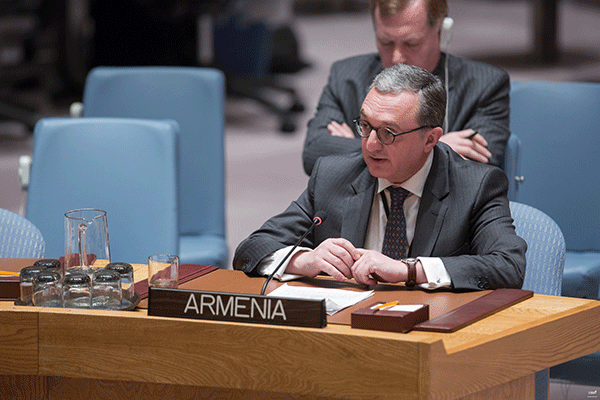On 15 February Permanent Representative of the Republic of Armenia to the United Nations, Ambassador Zohrab Mnatsakanyan delivered a statement during the Security Council Open Debate on “Respect for the Principles and Purposes of the Charter of the United Nations as a key element for the maintenance of international peace and security.”
In his statement, Ambassador Mnatsakanyan expressed appreciation to the Secretary General for his continued contribution to a comprehensive and consolidated approach to the trinity of peace, development and human rights. He noted that the history of humanity has indeed been marked by conflicts, conquests and wars; yet, the same history is overwhelmed with continued struggle of oppressed people for their freedom, self-determination and independence. Ambassador Mnatsakanyan furthermore reminded that the Charter is based on the reaffirmation of the faith in basic human rights and in the dignity and worth of the human person, and it is exactly due to these fundamental principles of the Charter that 193 free nations are gathered under the roof of the United Nations.
The Ambassador of Armenia referred to fundamental difficulties that often arise when the voice of the affected people is drowned in the justification and abuse of the principles of sovereignty, non-interference and territorial integrity, leading to political culture of repression, systematic violation of human rights and disregard of the rule of law. The people of Nagorno-Karabakh have effectively won their right to self-determination and freedom, yet, the continued cultivation of hatred and aggression, the entrenched culture of systematic violations of human rights in Azerbaijan, their continued war-mongering and effective refusal to achieve a swift and negotiated peace agreement, mediated by the OSCE Minsk Group Co-chairs, represent an actual physical threat to the people of Nagorno-Karabagh, Ambassador Mnatsakanyan explained. He furthermore stressed that consolidated support of the international community to the negotiating process within the agreed format is of uttermost importance, “not least in order to deny the unwilling party the privilege of procrastination, deviation from agreed principles of the settlement and forum shopping.”
Referring to the principles of sovereignty, the Ambassador of Armenia noted that sovereignty entails responsibility, whereas irresponsible sovereignty represents a threat to international peace and security. Building peaceful and inclusive societies is, therefore, as much about responsibility of government, as it is about sovereignty. In this regard, Ambassador Mnatsakanyan emphasized that enhanced international co-operation to this end is, therefore, compelling, not least when viewed strictly through the prism of maintenance of international peace. “The function of prevention and elaboration of early warning mechanisms and capacity to channel early signs of deteriorating situations into the UN system remains a vital objective,” – suggested Ambassador Mnatsakanyan, recalling the Framework Analyses for Atrocity Crimes as an important tool in this regard.
Read also
The Open Debate was presided by H.E. Delcy Rodríguez, Minister of Foreign Affairs of Venezuela. Representatives of about seventy state members, including Deputy Foreign Ministers of Angola, Spain, Guyana, Argentina and El Salvador, as well as UN Secretary-General Ban Ki Moon and a number of senior UN officials participated in the Open Debate.






















































